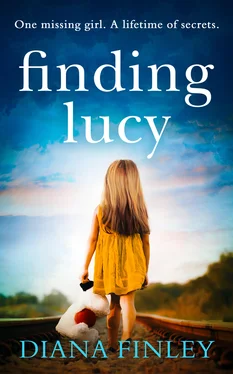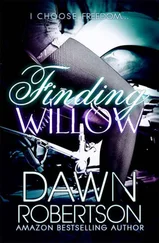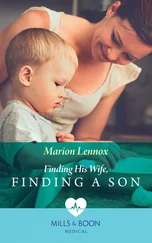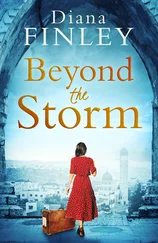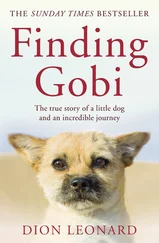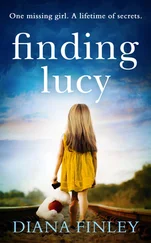‘Leg off,’ she said, her little hands tugging ineffectually at the doll’s limb. She looked at me. I sighed. Defeated, I prised the right leg out of its rubbery socket and handed the doll back to Lucy.
I knew it was important to introduce Lucy to our neighbours, but the thought of how she might behave filled me with apprehension. I took her first to meet Frank and Molly Armstrong. Molly tried to lift her up into an embrace, but Lucy immediately uttered a squeal, wriggled free and retreated behind me.
‘Oh I’m sorry, Molly – she’s very shy at the moment,’ I said. Molly nodded knowingly and went to a low cupboard in the corner of the room. She extracted a decorated box, crouched on the floor and took the lid off. Lucy watched with interest from behind my legs.
‘Frank, bring that blue and white tin tray from the kitchen, would you, pet?’
Molly emptied a cascade of buttons from the box onto the tray with a satisfying tinging noise. She poured the buttons back into the box and then emptied them onto the tray again. Lucy was mesmerised.
‘There you are, Lucy. You have a look at the pretty buttons, but don’t put them in your mouth, mind.’
Lucy spent half an hour picking up one handful of buttons after another and letting them drop onto the metal tray, time and time again. She didn’t utter a word during the entire visit. Molly and Frank seemed unperturbed. They watched her absorption in the activity with satisfaction.
‘I’m afraid she’s been very quiet … since her daddy died …’ I mouthed at them behind my hand.
‘Don’t you worry, Alison. Your Lucy’s been through a difficult time. She’ll come round before you know it,’ Frank said softly, as Molly made us some tea.
* * *
A few days later I took Lucy to see the Harmons. Michael was at work, but Susan and the children were home. Claire and Charlie were delighted to see Lucy. They brought lots of their toys to show her. She stared wide-eyed at them from the safety of my chair, her expression frozen.
‘Why won’t she play?’ asked Charlie, frowning.
‘Just leave her alone; let her do what she wants,’ said Claire. Such a mature, sensible child.
‘Charlie, will you come and help me get some squash and snacks, please?’ said Susan. They disappeared to the kitchen together. Claire brought a pile of picture books, put them on the floor near Lucy, and retreated. Lucy looked at her and then looked at the books. She looked at me, and then at the books again.
Susan and Charlie brought in a tray. After a few minutes, when Claire and Charlie were occupied with a bowl of crisps and a plate of chocolate animals, Lucy crawled hesitantly across the carpet towards the books and began looking at them. Claire looked at me and her mother, and smiled. Susan winked at her.
I began to realise that Susan had what I had always felt lacking in myself: an instinctive understanding of the thoughts, feelings and reactions of other people. What a wonderful ability it seemed to be, and clearly something that Claire had inherited, or perhaps learned, from her mother. Perhaps, in time, I could learn such skills myself.
People like Susan and Molly, close neighbours who had extended friendship to me, expressed no surprise that Lucy was quieter and more withdrawn than other children of her age. It was natural, they said, in view of her experience of losing her father, and the disruption this tragedy had imposed on our lives. Molly told me it was important for Lucy to play with other children.
‘She’s such a serious little mite, bless her – be nice to see her running about with some other little bairns her own age.’
‘Why don’t you take her to the playgroup next to the church?’ suggested Susan. ‘It would be good for her to play with other children. Charlie absolutely loved it. Be good for you to meet some other mums too. It’s just a couple of hours three times a week, and Harriet Grant, the playgroup leader, is absolutely fantastic at involving all the children, no matter how shy they are. Go on, Alison, it’d be good for both of you.’
So everyone seemed to know what was good for Lucy, and me – what was best for us. But shouldn’t Lucy be with me? Wasn’t it best for young children to spend as much time as possible with their mothers? Yes, my supporters replied – united in their opinions, it seemed – but it’s just as important for them to have the company of their “peers” – they need to learn to play cooperatively, to communicate, and develop their social skills.
I resented this interference, but in the end their perseverance won and I gave in. Susan came with me – just to introduce me to the playgroup staff and some of the mothers, she said. Lucy sat on my knee clinging tightly to my sleeve for the first half-hour. She’d been eyeing a dolls’ house on a table close to us. Eventually she slid cautiously off my lap and walked hesitantly towards her goal. Susan nudged me.
‘There you are,’ she whispered. ‘What did I tell you?’
A little girl was playing with the dolls and toy furniture, arranging them in one room, then moving them somewhere else. Lucy stood watching her for a few minutes. Then she sat down on the small chair next to her. The other little girl smiled and chatted about the toys.
‘I like that one, that mummy one,’ she said, pointing to a toy figure. ‘I gonna put her in the bath!’ She looked at Lucy and giggled.
Lucy watched her solemnly. She picked up a boy figure, bent his legs and sat him on a chair. She nodded. ‘Put Wy-yan on tair,’ she said.
Every now and then, as she explored the toys, Lucy turned around as if to check what I was doing. Watching her seeking me out for reassurance, I felt a terrible pain in my heart; a feeling that was both intense and mysterious, yet not altogether unpleasant.
I worked hard at building our life together, and ultimately felt confident that anyone who understood the situation would agree I was very successful, despite the difficult start. Of course, no one did truly understand – I had convinced myself that it was vital that no one should know, and that therefore no one could understand. Although I had never been someone who depended on friends and confidantes, my awareness of this conviction made me feel very lonely at times.
That first summer I rented a cottage for Lucy and me in south-west Scotland, just a hundred yards from the beach. We went for walks, dug endlessly in the sand, paddled and splashed in the shallows, collected shells, ate sandwiches on the beach for lunch, and fish and chips or hot dogs and ice creams for tea.
It was some weeks since Lucy had mentioned her “mam” or had cried. Very gradually she spoke more, looked at me more and even laughed sometimes. She loved stories. Some of our happiest times were spent in the library or curled up on the sofa, looking at picture books together. Every night when I tucked her up in bed, I remembered to hug Lucy and tell her how much I loved her.
Mother had been devoted to me in every way, I knew, but it was not in her nature, or perhaps her upbringing, to express affection openly in this way – and she was aware that I was not a child who enjoyed physical closeness. I was determined that I would have no such inhibitions with Lucy. Had she shown any signs of returning affection to me during those early weeks and months, it would have been so much easier, but she did not – or perhaps, she could not.
Читать дальше
